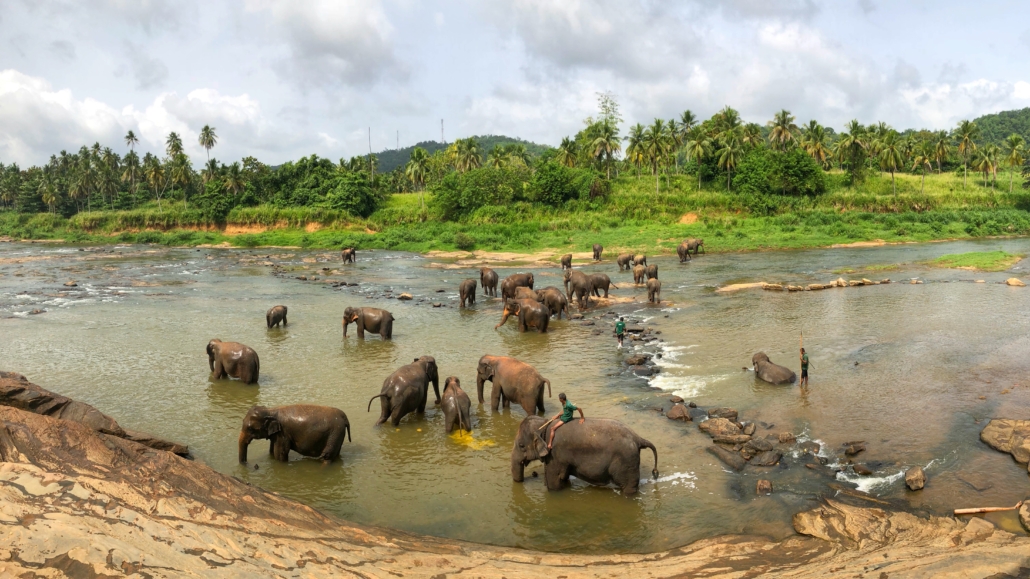How Elephant Poo Paper Is Alleviating Poverty in Sri Lanka
 Forty thousand of the global population of Asian elephants live in Sri Lanka. However, these elephants face a dire threat not from poaching but from people killing them due to their impact on agriculture. Since 1950, people have killed an estimated 4,000 elephants in Sri Lanka due to the fact they destroy crops and farmlands. Addressing the human-elephant conflict in Sri Lanka is complex. The solution to a successful coexistence between humans and elephants is to recognize elephants as an economic resource, offering sustainable employment opportunities in papermaking.
Forty thousand of the global population of Asian elephants live in Sri Lanka. However, these elephants face a dire threat not from poaching but from people killing them due to their impact on agriculture. Since 1950, people have killed an estimated 4,000 elephants in Sri Lanka due to the fact they destroy crops and farmlands. Addressing the human-elephant conflict in Sri Lanka is complex. The solution to a successful coexistence between humans and elephants is to recognize elephants as an economic resource, offering sustainable employment opportunities in papermaking.
Elephants defecate 16 times daily, and 100 kilograms of dung can be used as paper pulp. Sri Lanka has been exploiting this resource since 1997, and this genius idea of elephant poo paper has been responsible for alleviating poverty, facilitating job creation and rural empowerment. This process has also saved billions of trees from being axed because the Rainforest Action Network estimated that 3 to 7 billion trees are cut down globally to manufacture paper.
Sri Lanka’s Elephant Dung Paper Industry
Eco Maximus is a foundation that began in 1997 that exploits the huge excretory system of elephants, purchasing manure from elephant sanctuaries. A portion of the trust’s earnings goes towards the Millennium Elephant Foundation (MEF), an NGO that provides a secure haven for sick, elderly and disabled elephants. Without the care that the foundation provided, these elephants are in danger. When one purchases and uses products made from elephant dung paper, they actively enhance the well-being of Sri Lanka’s magnificent elephants.
Local Impact on Poverty
The elephant poo paper industry is alleviating poverty in Sri Lanka. This innovative sector creates sustainable job opportunities, by hiring rural people to collect the elephant dung not only addresses the pressing need for employment but also becomes a catalyst for economic empowerment, building local economies to be self-reliant. Individuals engaged in collecting, processing and crafting paper products increase income and, in turn, contribute to alleviating poverty in Sri Lanka.
Local artisans craft the products and empower the lives of both the community members and the elephants, with the business employing 150 people as of 2020. Artisans find purpose and livelihoods within the elephant poo paper production process, showcasing the potential of unconventional industries to alleviate poverty in Sri Lanka. This enhances their proficiency in the industry and broadens their employability and income-earning potential. As the artisans become adept at transforming elephant dung into unique, eco-friendly paper products, their newfound skills contribute to a sustainable and self-reliant livelihood.
One notable initiative is the “Ellie Pooh” project, where local artisans collect and process elephant dung to create a range of handmade paper products such as notebooks, cards and stationery. Although it may not entirely eradicate the human-elephant conflict in Sri Lanka, Ellie Pooh’s paper has significantly increased farmers’ tolerance towards elephants. Consequently, elephants are viewed more as economic assets than mere nuisances or threats. This shift in perspective makes the local population less inclined to see elephants as a problem that needs elimination. The role of Ellie Pooh’s paper becomes crucial in the conservation efforts to preserve the population of Asian elephants in Sri Lanka.
The Future
The prospects of the elephant dung paper industry in Sri Lanka are promising, with the potential to shape the country’s economic landscape significantly. As the industry gains traction, there is room for substantial growth, driven by increasing demand for sustainable and eco-friendly products worldwide. The unique nature of elephant dung paper positions it as a distinctive player in the market, attracting environmentally conscious consumers. Furthermore, the industry’s positive impact on poverty reduction, skill development and community empowerment enhances its social value, making it an integral part of Sri Lanka’s economic fabric.
By continuing to innovate, establish strategic partnerships and address challenges, the industry can contribute to sustainable economic growth and serve as a model for other environmentally friendly initiatives. As awareness of the industry grows, its role in shaping Sri Lanka’s economic landscape will likely expand, offering a harmonious blend of economic prosperity and environmental conservation.
Conclusion
The elephant dung paper industry is a transformative force in alleviating poverty in Sri Lanka, embodying a synergy between unconventional livelihoods, economic empowerment and environmental sustainability. By converting a perceived problem, the human-elephant conflict, into a solution, this industry provides sustainable jobs, income opportunities and community empowerment. The symbiotic relationship between humans and elephants is undergoing redefinition as communities utilize elephants for economic opportunity.
– Ellen Jones
Photo: Unsplash
